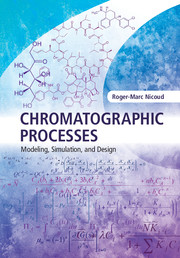Book contents
- Frontmatter
- Contents
- Preface and acknowledgments
- 1 Our approach to modeling chromatographic processes
- 2 Linear chromatography: the Russian Lego
- 3 Non-linear chromatography: equilibrium theory
- 4 Fluid–solid phase equilibria
- 5 Mass transfer
- 6 Hydrodynamics of chromatographic columns
- 7 Simulating chromatographic columns
- 8 Counter-current systems
- 9 Chromatographic modes and their optimization
- 10 Addressing a few industrial problems
- 11 Conclusion
- Appendix A Some important properties of the Laplace transform
- Appendix B Inlet and outlet boundary conditions
- Appendix C Equilibrium theory: single-solute chromatograms
- Appendix D Equilibrium theory: binary chromatograms
- Appendix E The influence of the porosity determination on chromatographic modeling
- Appendix F Useful physico-chemical data and orders of magnitude
- Appendix G Fick and Maxwell–Stefan approaches to diffusion
- Appendix H Non-linear LDF for multi-solute systems
- Appendix I Situations that make the use of the MC model problematic
- Appendix J Typical industrial chromatographic processes
- Notation
- Index
Preface and acknowledgments
Published online by Cambridge University Press: 05 April 2015
- Frontmatter
- Contents
- Preface and acknowledgments
- 1 Our approach to modeling chromatographic processes
- 2 Linear chromatography: the Russian Lego
- 3 Non-linear chromatography: equilibrium theory
- 4 Fluid–solid phase equilibria
- 5 Mass transfer
- 6 Hydrodynamics of chromatographic columns
- 7 Simulating chromatographic columns
- 8 Counter-current systems
- 9 Chromatographic modes and their optimization
- 10 Addressing a few industrial problems
- 11 Conclusion
- Appendix A Some important properties of the Laplace transform
- Appendix B Inlet and outlet boundary conditions
- Appendix C Equilibrium theory: single-solute chromatograms
- Appendix D Equilibrium theory: binary chromatograms
- Appendix E The influence of the porosity determination on chromatographic modeling
- Appendix F Useful physico-chemical data and orders of magnitude
- Appendix G Fick and Maxwell–Stefan approaches to diffusion
- Appendix H Non-linear LDF for multi-solute systems
- Appendix I Situations that make the use of the MC model problematic
- Appendix J Typical industrial chromatographic processes
- Notation
- Index
Summary
No three inventions have had greater impact on the working day of the physical scientist than the computer, the photocopier and the chromatograph. Friedrich Helfferich, 1986
The dramatic increase in purification needs, from the development to the production stage, especially in the pharmaceutical and biopharmaceutical industries, has led preparative chromatography to become a widely used technology. There are now so many companies, teams and individuals using or developing preparative chromatographic processes that a real chromatographic world has appeared during the last decades.
Experience shows that very diverse people are living in the chromatographic world. Some of them come from the “Chemists” planet and they speak about polarity, adsorbent deactivation or resolution. The ones from the “Biochemists” planet speak about protein denaturation, isoelectric points or viral contamination. Others come from the “Chemical Engineers” planet and speak about mass transfer, dispersion coefficients and adsorption isotherms. Those from the “Pharmacists” planet speak about contamination or good manufacturing practices. One can even find people from the “Mathematicians” planet, speaking about Riemann invariants or Laplace transforms. Obviously, since all of these people use their own language, the chromatographic world may sound very dissonant, not propitious for discussion.
My experience, skills and passion are certainly on the chemical engineering side. The chemical engineering methodology, “La voie Royale” in the terminology of Jacques Villermaux, sounds like a rational way to approach complex problems. My confidence in the ability of this approach to efficiently design chromatographic processes is at the origin of my decision to create Novasep. Twenty years later, I know how fruitful the approach is, but I also know how hard it is to explain and to diffuse it. Rational chemical engineering approaches are too seldom used in the industry, and the emergence of Quality by Design (QbD) and associated Design of Experiments (DoE) approaches, encouraged by the authorities and embraced by the industry, sounds too often like a refusal to understand the physics of chromatography.
- Type
- Chapter
- Information
- Chromatographic ProcessesModeling, Simulation, and Design, pp. xiii - xviPublisher: Cambridge University PressPrint publication year: 2015



